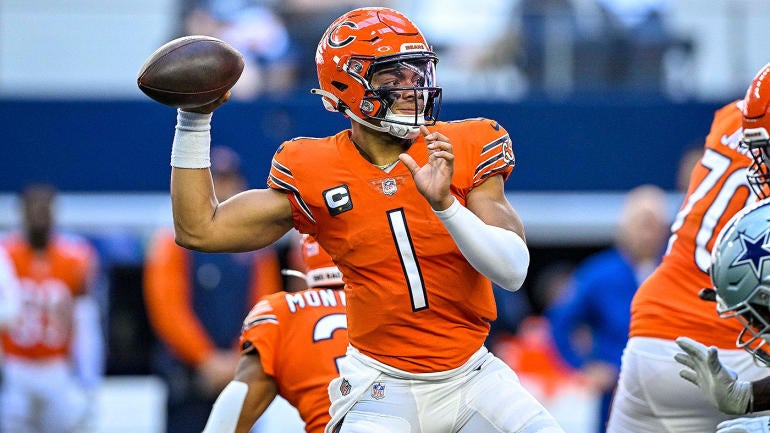
The Chicago Bears own the No. 1 pick in the 2024 NFL Draft, and many already expect them to use that pick to reset the quarterback position. There are largely two reasons for that: Consensus top prospect Caleb Williams arguably offers more upside than current starter Justin Fields, and Fields is already entering the final year of his rookie contract. But is it true that retaining Fields would be cost-prohibitive, considering he'll soon be ripe for a new deal? Or is that a major miscalculation?
Let's start with the facts: Fields is due to count $6 million against the Bears' 2024 salary cap. That number ranks 28th among QBs for next season, meaning Chicago would actually be deploying one of the NFL's most-affordable starting QBs if it kept Fields rather than drafted his successor. Williams himself may not be much cheaper (if at all), as Spotrac estimates this year's No. 1 draft pick will net a four-year, $38.5 million rookie deal -- earning a projected $9.625 million per year.
But this isn't about 2024, you say. Drafting someone like Williams would be a long-term move, forgoing the need to commit lucrative money to Fields beyond this year. Certainly there's some truth to that. At present, having logged almost 40 NFL starts, flashing Pro Bowl-caliber athleticism with a 1,000-yard rushing season, Fields can theoretically command more money than the QB who's yet to take an NFL snap -- even though, were incoming rookies permitted to operate as free agents, Williams would almost surely prove to be the greater commodity.
If it's long-term finances that are steering the decision, however, the notion of Fields hamstringing the Bears with an inevitable extension is probably overstated. What, after all, is the chief scenario in which Fields warrants a new big-money deal? A massive 2024 breakout? If that occurs, it would mean a legitimate step forward for an already-promising young QB with three other years of starting experience. Why wouldn't the Bears be interested in locking him up then? Fields has had his issues, sure, but it's not as if a major leap forward in 2024 would represent the only time he's shown starting-caliber stuff at the NFL level.
There is little evidence among recent QB extensions that a team instantly loses its ability to field a playoff-ready roster once it pays its signal-caller. Consider the Philadelphia Eagles' Jalen Hurts, who just last year inked a record five-year, $255 million extension but will count only $13.6 million against the 2024 cap (18th among QBs), then just $21.8 million (16th) in 2025. Not until 2026 is Hurts even scheduled to sniff the top 10 in terms of a yearly cap charge. Credit that to the Eagles front office, for backloading such a massive deal, but remember also that Hurts earned his payday immediately following a Super Bowl run.
Even if Fields were to dominate in 2024 as the Bears' QB1, it's unlikely he'd own as much leverage as Hurts, who was fresh off a title-game shootout with Patrick Mahomes. Which means, barring a catastrophic negotiation from the Bears' front office, Fields is also unlikely to command an even greater percentage of his team's cap at the front end of a new deal. Even if he did, Chicago is consistently projected to have more cap space than most teams between now and 2026 -- which is a long time in the NFL. Specifically, they are estimated to rank No. 3, No. 10 and No. 12 over the next three seasons, per Over the Cap.
If the Bears can't adequately fit a Fields extension and a playoff-caliber supporting cast into that timeframe, with that kind of money at their disposal, then frankly, the issue is with the Bears, not Fields or any contract his play warrants. The current regime egregiously failed to surround Fields with even average protection and weapons going into 2022, his first full year as a starter; then took only a mild step forward in that regard a year ago, despite owning a wealth of cap space and draft picks. A bet on Williams over Fields would register more as a bet on Williams saving them from their own failures to assemble a competitive team than a bet on Williams saving them from the price tag of a Fields extension.
Undiscussed to this point is the other possibility of the Bears delaying their own decision on Fields' future. Chicago has until May 2 to exercise a fifth-year option at an estimated $25.6 million, which would presently rank 14th among QB cap hits for 2025. This would effectively keep Fields under contract at a reasonable rate for another two seasons -- through his age-26 campaign -- while enabling the Bears to use their cap space and high draft picks to continue building his setup.
Might the Bears regret missing out on Williams or another incoming rookie if they went this route and ultimately determined Fields wasn't the answer? Sure. That's the real reason for debate here. But to suggest they ought to hurry and move off Fields for the sake of saving money -- for the sake of finally building the contender around a young QB -- is to overlook the fact plenty of other teams are coming off playoff runs with expensive vets, from the Eagles and title-winning Kansas City Chiefs to the AFC runner-up Baltimore Ravens and hot-down-the-stretch Buffalo Bills. Is Fields in the same tier as the QBs for those teams? Not now. Will he be someday? Maybe. Maybe not.
But the Bears shouldn't be kicking him to the curb because they're afraid of the possibility his cost will soon skyrocket. Not until they've first held up their end of the bargain -- of properly making use of their resources. The clock is ticking on them doing just that, either for Fields, for Caleb Williams, or whomever ends up under center in 2024 and beyond.


















